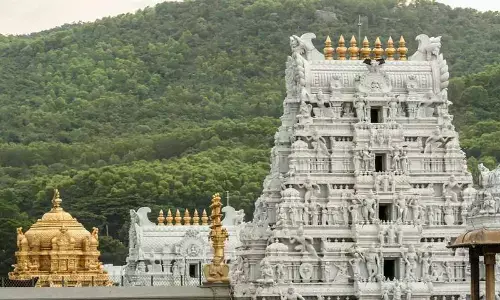Gurajada, the English writer

Gurajada Venkata Apparao (1862-1915), popularly known as ‘Gurajada’, who ushered in the modern era into Telugu literature, surprisingly started his writing career in 1882 as a poet writing in English. His English poem ‘Sarangadhara’ written in 1882 makes him one of the first Indo-English writers of India, preceding young Aurobindo, Tagore, and Sarojini Naidu by decades.
Revisiting Gurajada on his 152nd birth anniversary, as one of the foremost Indo-English writers and as someone who represented the composite culture of his time by using Urdu words in conversational Telugu
 Gurajada Venkata Apparao (1862-1915), popularly known as ‘Gurajada’, who ushered in the modern era into Telugu literature, surprisingly started his writing career in 1882 as a poet writing in English. His English poem ‘Sarangadhara’ written in 1882 makes him one of the first Indo-English writers of India, preceding young Aurobindo, Tagore, and Sarojini Naidu by decades. The poem was first published in the “Indian Leisure Hour” by Gundukurti Venkata Ramanayya at Vizianagaram and subsequently published in Calcutta.
Gurajada Venkata Apparao (1862-1915), popularly known as ‘Gurajada’, who ushered in the modern era into Telugu literature, surprisingly started his writing career in 1882 as a poet writing in English. His English poem ‘Sarangadhara’ written in 1882 makes him one of the first Indo-English writers of India, preceding young Aurobindo, Tagore, and Sarojini Naidu by decades. The poem was first published in the “Indian Leisure Hour” by Gundukurti Venkata Ramanayya at Vizianagaram and subsequently published in Calcutta.
In Bengal, Toru Dutt, Indian poet who wrote in English and French passed away at a young age (1877) and only Michael Madhusudan Dutt was active in the field with his writings by 1862. The unique facet of Gurajada as a 19th Century Indo-English Poetstill remains to be explored. Editor and publisher of the Bengal periodical ‘Reese and Rayyat” from Calcutta, Sambhuchandra Mukherjee, advised this young poet who was evidently writing in blank verse, to observe some rhyme scheme, so as to make the poem memorable.
It is not just ‘Sarangadhara’, in his early twenties, Gurajada went on to write in English, the two prefaces to his magnum opus ‘Kanyasulkam’, a poem sarcastically addressed to Congress sessions, his diaries, a story in English named ‘Stooping to raise’ and the ‘Note of Dissent’ running into some two hundred pages in English in defense of the opportunity to be given to the students to answer their essay question in vernacular Telugu, which the traditionalists led by Jayanti Ramayya Pantulu, Vedam Venkata Raya Sastry and others had severely opposed.
This ‘Note of Dissent’ was submitted to the Madras University Telugu Composition Committee in his capacity as a Member of the committee. For this continuous and life long creative activity in English and considering his English works, which are a significant part of his total oeuvre, a new approach to focus on the significance of his English writings need to be formulated to further understand his genius.
Urdu words in the play “Kanyasulkam”
The 19th century Vizianagaram was a place of vassal kings, where, owing to the historical fact of long centuries of Muslim rule prior to the rule of the British, many words of Hindustani have entered the parlance. The chief occupation being agriculture, most of the land related and revenue oriented terminology constituted Hindustanee words like rabi, kharif, sist, firqa, tahasil, tashasildar, inam, saal, fasal, magroor, saakeen, etc., With his commitment to write the play in the language spoken by the people, i.e. spoken dialect, Gurajada, not only used the vernacular, the way it was spoken by different communities, he also liberally used the Urdu words prevalent in the society (words like behadbee, kummak, aabroo) in the play ‘Kanyasulkam’. A rough count says the author had used more than 130 such words in the entire play and even characters without formal education and from lower rungs of society have spoken these words in the play.
This becomes an interesting observation because, the Telugu puritans and saviours of Telugu always want to cleanse the language of foreign words, by which they mean, only English words. None of them, surprisingly, say anything about the Urdu or Hindustani words, which have been long settled in the Telugu language and are a part of the peoples’ expression across villages, towns and cities. Even in his stories like ‘Matilda’, and ‘Stooping to Rise’, he had used words like “chaman” (small garden) and “Khaayida”(putting someone to hardship) to indicate the composite culture he was representing. In fact, the name “Stooping to Rise”, his one and only story written in English, seems to be a take off from Oliver Goldsmith’s comedy, titled “Stooping to conquer” which was first performed in London, in 1773.
In his writing career spanning across more than three decades (from 1882 to 1915), he had enriched Telugu literature with a thoroughly path breaking modern drama Kanyasulkam (Bride –price), five stories, a handful of poems, and emerged as a game-changer, pitching in with his powerful and simple voice, underlining the importance of creating people-centric literature and moving away from the old discipline of feudal fettered expression circling around royal courts, palaces and kingdoms. The vernacular language he championed, thanks to his visionary role, emerged as the language order of the present society, and therein lies the long -lasting and glittering accomplishment of Gurajada, which makes him rightfully, “Father of the Modern Telugu Literature’.
New Directions
On his magnum opus ‘Kanyasulkam’, a quiz is being organised on September 21 at Visakhapatnam for the first time, to mark his 152nd birth anniversary by literary organisations Mosaic, and Sahitya Surabhi. Kanyasulkam for children in pictorial style is a project to endear the play to younger generation, and the spade work for this “Balala Kanyasulkam” is in the advanced stage.
A special study has been launched to focus on the Urdu words in the play ‘Kanyasulkam’, and thus to prove the liberal and cosmopolitan attitude of the great writer in understanding and promoting the cause of literature as a catalyst in the overall development of the society.











